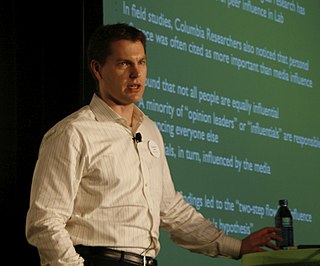
Duncan James Watts is a computational social scientist and a professor at the University of Pennsylvania. He was formerly a principal researcher at Microsoft Research in New York City,and is known for his work on small-world networks.

Computational sociology is a branch of sociology that uses computationally intensive methods to analyze and model social phenomena. Using computer simulations,artificial intelligence,complex statistical methods,and analytic approaches like social network analysis,computational sociology develops and tests theories of complex social processes through bottom-up modeling of social interactions.

Diffusion of innovations is a theory that seeks to explain how,why,and at what rate new ideas and technology spread. The theory was popularized by Everett Rogers in his book Diffusion of Innovations,first published in 1962. Rogers argues that diffusion is the process by which an innovation is communicated through certain channels over time among the participants in a social system. The origins of the diffusion of innovations theory are varied and span multiple disciplines.

Homophily is a concept in sociology describing the tendency of individuals to associate and bond with similar others,as in the proverb "birds of a feather flock together". The presence of homophily has been discovered in a vast array of network studies:over 100 studies have observed homophily in some form or another,and they establish that similarity is associated with connection. The categories on which homophily occurs include age,gender,class,and organizational role.
Emotional contagion is a form of social contagion that involves the spontaneous spread of emotions and related behaviors. Such emotional convergence can happen from one person to another,or in a larger group. Emotions can be shared across individuals in many ways,both implicitly or explicitly. For instance,conscious reasoning,analysis,and imagination have all been found to contribute to the phenomenon. The behaviour has been found in humans,other primates,dogs,and chickens.
In the study of complex networks,assortative mixing,or assortativity,is a bias in favor of connections between network nodes with similar characteristics. In the specific case of social networks,assortative mixing is also known as homophily. The rarer disassortative mixing is a bias in favor of connections between dissimilar nodes.

The traditional kitchen garden,vegetable garden,also known as a potager or in Scotland a kailyaird,is a space separate from the rest of the residential garden –the ornamental plants and lawn areas. It is used for growing edible plants and often some medicinal plants,especially historically. The plants are grown for domestic use;though some seasonal surpluses are given away or sold,a commercial operation growing a variety of vegetables is more commonly termed a market garden. The kitchen garden is different not only in its history,but also its functional design. It differs from an allotment in that a kitchen garden is on private land attached or very close to the dwelling. It is regarded as essential that the kitchen garden could be quickly accessed by the cook.
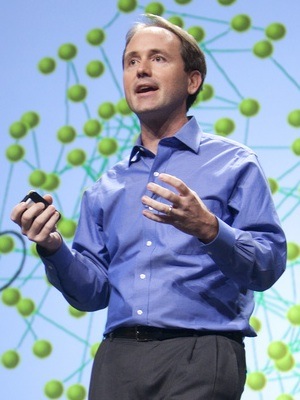
James H. Fowler is an American social scientist specializing in social networks,cooperation,political participation,and genopolitics. He is currently Professor of Medical Genetics in the School of Medicine and Professor of Political Science in the Division of Social Science at the University of California,San Diego. He was named a 2010 Fellow of the John Simon Guggenheim Foundation.

In news media and social media,an echo chamber is an environment or ecosystem in which participants encounter beliefs that amplify or reinforce their preexisting beliefs by communication and repetition inside a closed system and insulated from rebuttal. An echo chamber circulates existing views without encountering opposing views,potentially resulting in confirmation bias. Echo chambers may increase social and political polarization and extremism. On social media,it is thought that echo chambers limit exposure to diverse perspectives,and favor and reinforce presupposed narratives and ideologies.
Behavioral contagion is a form of social contagion involving the spread of behavior through a group. It refers to the propensity for a person to copy a certain behavior of others who are either in the vicinity,or whom they have been exposed to. The term was originally used by Gustave Le Bon in his 1895 work The Crowd:A Study of the Popular Mind to explain undesirable aspects of behavior of people in crowds. In the digital age,behavioral contagion is also concerned with the spread of online behavior and information. A variety of behavioral contagion mechanisms were incorporated in models of collective human behavior.
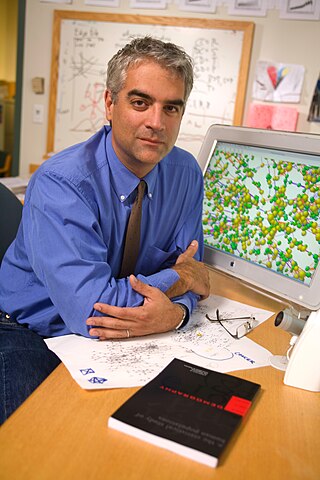
Nicholas A. Christakis is a Greek-American sociologist and physician known for his research on social networks and on the socioeconomic,biosocial,and evolutionary determinants of human welfare. He is the Sterling Professor of Social and Natural Science at Yale University,where he directs the Human Nature Lab. He is also the co-director of the Yale Institute for Network Science.

Dirk Brockmann is a German physicist and Professor at the Institute for Biology at Humboldt University of Berlin and the Robert Koch Institute,Berlin. Brockmann is known for his work in complex systems,complex networks,computational epidemiology,human mobility and anomalous diffusion.
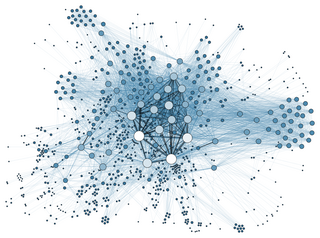
Social contagion involves behaviour,emotions,or conditions spreading spontaneously through a group or network. The phenomenon has been discussed by social scientists since the late 19th century,although much work on the subject was based on unclear or even contradictory conceptions of what social contagion is,so exact definitions vary. Some scholars include the unplanned spread of ideas through a population as social contagion,though others prefer to class that as memetics. Generally social contagion is understood to be separate from the collective behaviour which results from a direct attempt to exert social influence.
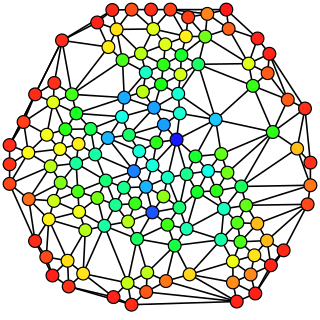
In graph theory,betweenness centrality is a measure of centrality in a graph based on shortest paths. For every pair of vertices in a connected graph,there exists at least one shortest path between the vertices such that either the number of edges that the path passes through or the sum of the weights of the edges is minimized. The betweenness centrality for each vertex is the number of these shortest paths that pass through the vertex.
Complex contagion is the phenomenon in social networks in which multiple sources of exposure to an innovation are required before an individual adopts the change of behavior. It differs from simple contagion in that unlike a disease,it may not be possible for the innovation to spread after only one incident of contact with an infected neighbor. The spread of complex contagion across a network of people may depend on many social and economic factors;for instance,how many of one's friends adopt the new idea as well as how many of them cannot influence the individual,as well as their own disposition in embracing change.

A social network is a social structure made up of a set of social actors,sets of dyadic ties,and other social interactions between actors. The social network perspective provides a set of methods for analyzing the structure of whole social entities as well as a variety of theories explaining the patterns observed in these structures. The study of these structures uses social network analysis to identify local and global patterns,locate influential entities,and examine network dynamics.
Three Degrees of Influence is a theory in the realm of social networks,proposed by Nicholas A. Christakis and James H. Fowler in 2007. It has since been explored by scientists in numerous disciplines using diverse statistical,psychological,sociological,and biological approaches. Numerous large-scale experiments have also documented this phenomenon in the intervening years.
Matthew Owen Jackson is the William D. Eberle Professor of Economics at Stanford University,an external faculty member of the Santa Fe Institute,and a fellow of CIFAR.

Global cascades models are a class of models aiming to model large and rare cascades that are triggered by exogenous perturbations which are relatively small compared with the size of the system. The phenomenon occurs ubiquitously in various systems,like information cascades in social systems,stock market crashes in economic systems,and cascading failure in physics infrastructure networks. The models capture some essential properties of such phenomenon.

Matthew Jeffrey Salganik is an American sociologist and professor of sociology at Princeton University with a special interest on social networks and computational social science.













